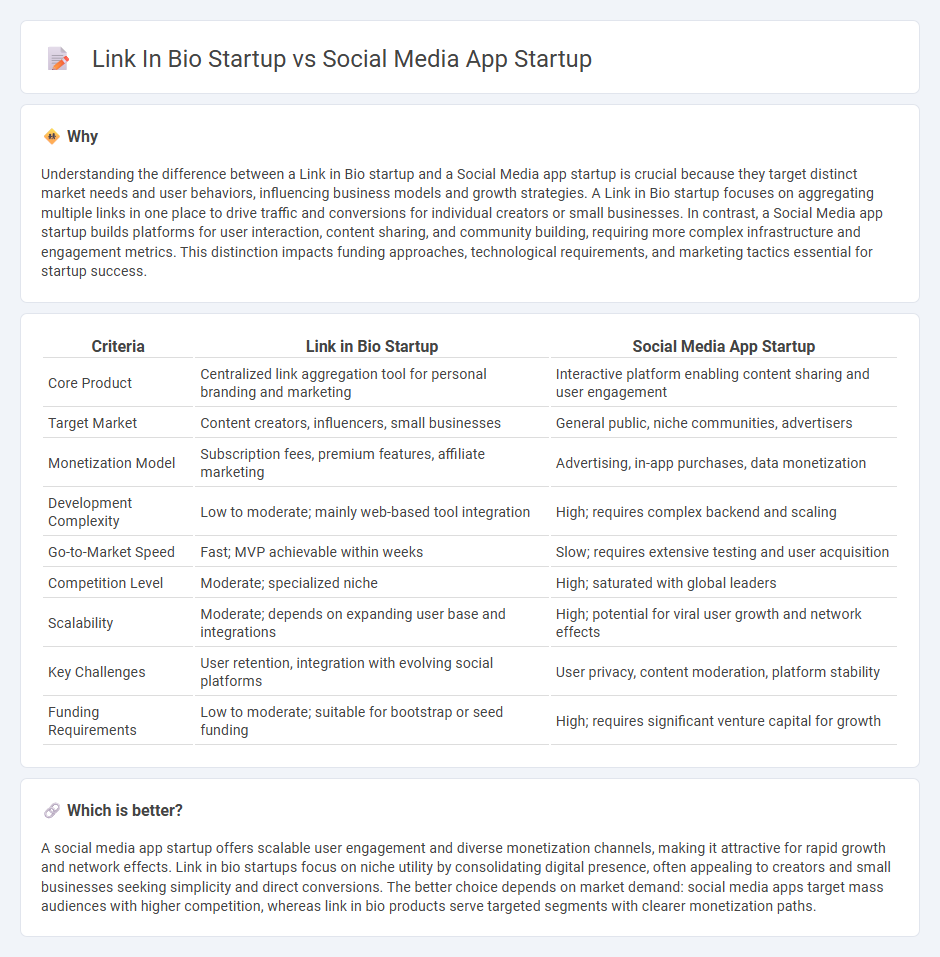
Entrepreneurship in the tech space often contrasts Link in Bio startups, which streamline online presence by aggregating digital touchpoints, with Social Media app startups that focus on creating interactive platforms for user engagement and content sharing. Link in Bio services emphasize simplicity and conversion optimization, while Social Media apps invest heavily in user retention through innovative features and network effects. Explore the unique challenges and opportunities each startup type presents to better understand their market dynamics and growth potential.
Why it is important
Understanding the difference between a Link in Bio startup and a Social Media app startup is crucial because they target distinct market needs and user behaviors, influencing business models and growth strategies. A Link in Bio startup focuses on aggregating multiple links in one place to drive traffic and conversions for individual creators or small businesses. In contrast, a Social Media app startup builds platforms for user interaction, content sharing, and community building, requiring more complex infrastructure and engagement metrics. This distinction impacts funding approaches, technological requirements, and marketing tactics essential for startup success.
Comparison Table
| Criteria | Link in Bio Startup | Social Media App Startup |
|---|---|---|
| Core Product | Centralized link aggregation tool for personal branding and marketing | Interactive platform enabling content sharing and user engagement |
| Target Market | Content creators, influencers, small businesses | General public, niche communities, advertisers |
| Monetization Model | Subscription fees, premium features, affiliate marketing | Advertising, in-app purchases, data monetization |
| Development Complexity | Low to moderate; mainly web-based tool integration | High; requires complex backend and scaling |
| Go-to-Market Speed | Fast; MVP achievable within weeks | Slow; requires extensive testing and user acquisition |
| Competition Level | Moderate; specialized niche | High; saturated with global leaders |
| Scalability | Moderate; depends on expanding user base and integrations | High; potential for viral user growth and network effects |
| Key Challenges | User retention, integration with evolving social platforms | User privacy, content moderation, platform stability |
| Funding Requirements | Low to moderate; suitable for bootstrap or seed funding | High; requires significant venture capital for growth |
Which is better?
A social media app startup offers scalable user engagement and diverse monetization channels, making it attractive for rapid growth and network effects. Link in bio startups focus on niche utility by consolidating digital presence, often appealing to creators and small businesses seeking simplicity and direct conversions. The better choice depends on market demand: social media apps target mass audiences with higher competition, whereas link in bio products serve targeted segments with clearer monetization paths.
Connection
Link in bio startups enhance social media app startups by optimizing user engagement and streamlining online presence through centralized digital profiles. These platforms capitalize on social media traffic, transforming clicks into measurable conversions and monetization opportunities. The synergy between them drives growth, user acquisition, and effective brand representation in the digital entrepreneurship ecosystem.
Key Terms
**Social Media App Startup:**
Social media app startups prioritize creating innovative platforms that connect users through engaging content, real-time interactions, and personalized experiences, leveraging advanced algorithms and AI for user retention and growth. These startups require substantial investment in scalable infrastructure, user acquisition strategies, and continuous feature development to compete with established industry giants like TikTok, Instagram, and Snapchat. Explore our insights on building a successful social media app startup to stay ahead in this dynamic market.
User Engagement
Social media app startups prioritize real-time interactions, content sharing, and community building to maximize user engagement through features like live chats, stories, and interactive polls. Link in bio startups emphasize streamlined user navigation by aggregating multiple links into a single, customizable landing page, enhancing click-through rates and seamless user experience. Explore deeper insights on optimizing user engagement strategies for both startup models.
Network Effects
Social media app startups leverage strong network effects by encouraging user interaction, content sharing, and community building to rapidly grow their user base and increase platform value. Link in bio startups harness network effects more subtly by integrating multiple online presences, driving traffic, and increasing user engagement through customizable and shareable links. Explore how these contrasting approaches to network effects shape the growth strategies and success potential of digital startups.
Source and External Links
110 Unique Social Media App Ideas for Startups - This article provides comprehensive steps for launching a social media app, including brainstorming, creating a proof of concept, developing an MVP, and marketing the app to reach target users.
15 Innovative Social Media Startups to Follow - Highlights emerging social media startups like Pepper (for food lovers), Partiful (event planning), and ShareChat (regional language content in India), showcasing diverse niche opportunities within social media.
Own, a new social media app, aims to tokenize the creator economy - Own is a recent startup focusing on empowering creators through content ownership and fair pay, offering a multi-format feed and has raised over $5 million in funding.
 dowidth.com
dowidth.com